Emotional Intelligence, Cultural Intelligence & Diversity
VerifiedAdded on 2023/04/21
|15
|2715
|52
AI Summary
This report discusses the importance of emotional intelligence in the workplace and proposes a workshop to develop emotional intelligence competencies. It covers topics such as self-awareness, behavioral analysis, and listening skills. The workshop aims to enhance participants' ability to recognize and utilize emotional information for effective decision-making and relationship-building.
Contribute Materials
Your contribution can guide someone’s learning journey. Share your
documents today.
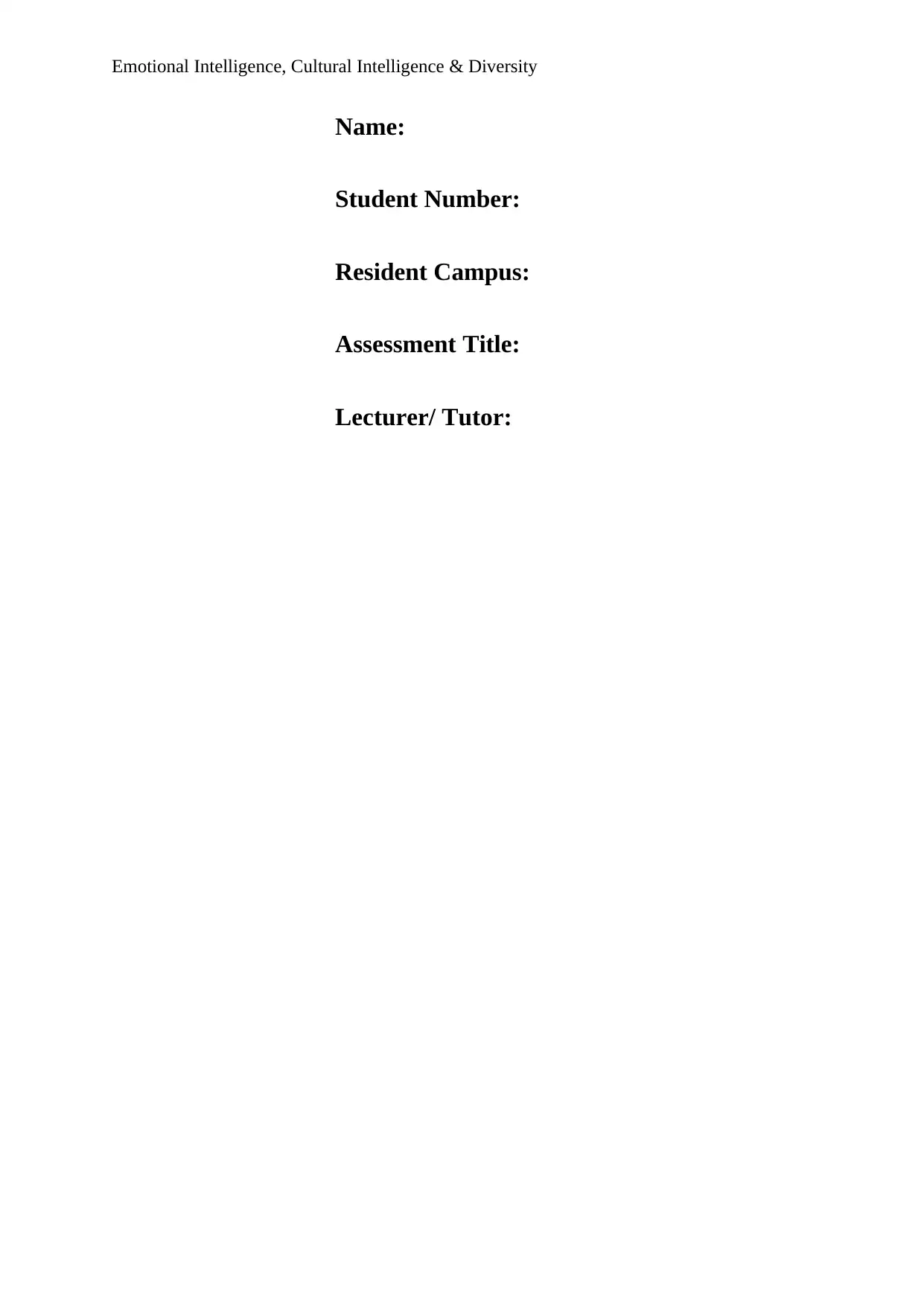
Emotional Intelligence, Cultural Intelligence & Diversity
Name:
Student Number:
Resident Campus:
Assessment Title:
Lecturer/ Tutor:
Name:
Student Number:
Resident Campus:
Assessment Title:
Lecturer/ Tutor:
Secure Best Marks with AI Grader
Need help grading? Try our AI Grader for instant feedback on your assignments.
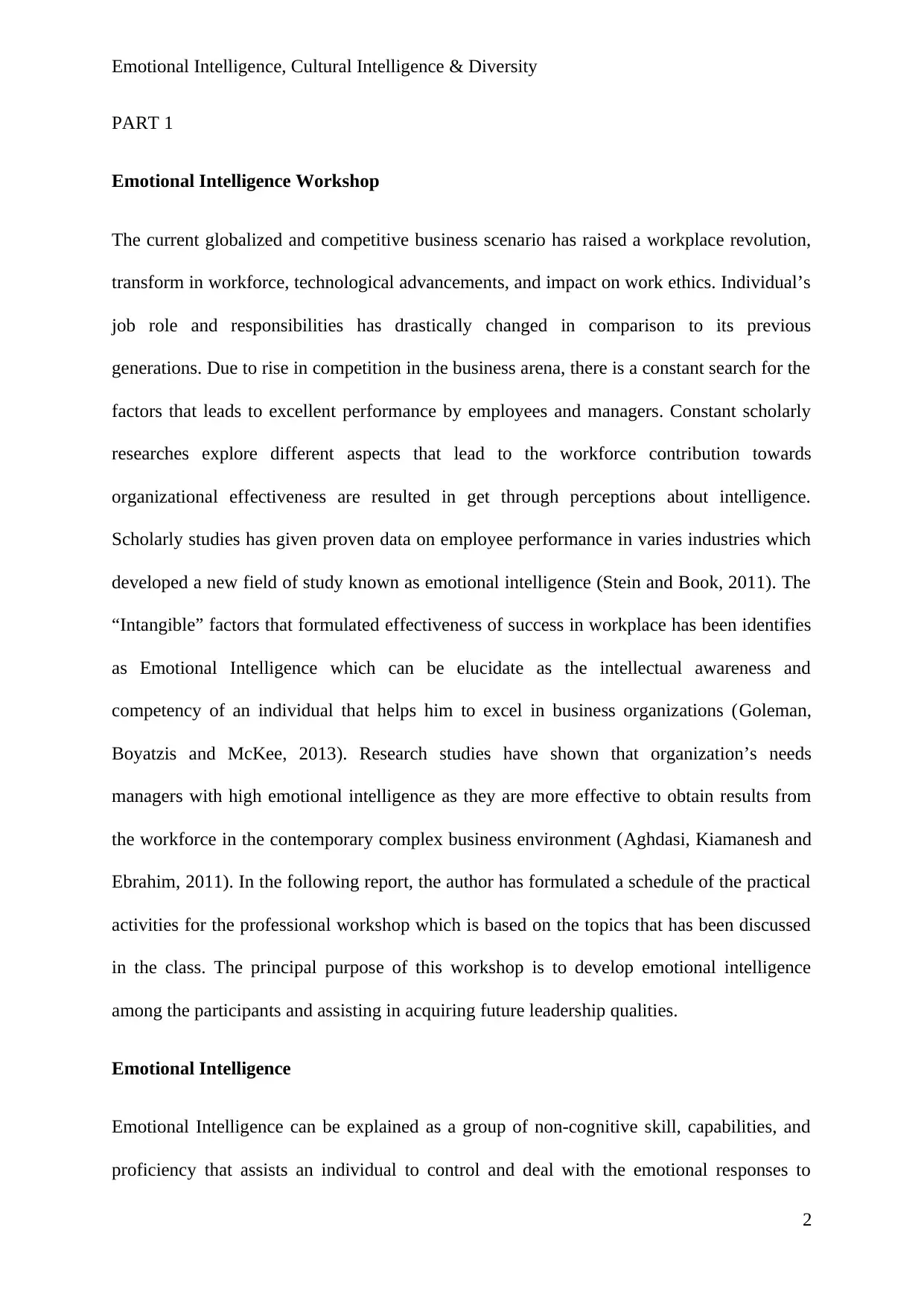
Emotional Intelligence, Cultural Intelligence & Diversity
PART 1
Emotional Intelligence Workshop
The current globalized and competitive business scenario has raised a workplace revolution,
transform in workforce, technological advancements, and impact on work ethics. Individual’s
job role and responsibilities has drastically changed in comparison to its previous
generations. Due to rise in competition in the business arena, there is a constant search for the
factors that leads to excellent performance by employees and managers. Constant scholarly
researches explore different aspects that lead to the workforce contribution towards
organizational effectiveness are resulted in get through perceptions about intelligence.
Scholarly studies has given proven data on employee performance in varies industries which
developed a new field of study known as emotional intelligence (Stein and Book, 2011). The
“Intangible” factors that formulated effectiveness of success in workplace has been identifies
as Emotional Intelligence which can be elucidate as the intellectual awareness and
competency of an individual that helps him to excel in business organizations (Goleman,
Boyatzis and McKee, 2013). Research studies have shown that organization’s needs
managers with high emotional intelligence as they are more effective to obtain results from
the workforce in the contemporary complex business environment (Aghdasi, Kiamanesh and
Ebrahim, 2011). In the following report, the author has formulated a schedule of the practical
activities for the professional workshop which is based on the topics that has been discussed
in the class. The principal purpose of this workshop is to develop emotional intelligence
among the participants and assisting in acquiring future leadership qualities.
Emotional Intelligence
Emotional Intelligence can be explained as a group of non-cognitive skill, capabilities, and
proficiency that assists an individual to control and deal with the emotional responses to
2
PART 1
Emotional Intelligence Workshop
The current globalized and competitive business scenario has raised a workplace revolution,
transform in workforce, technological advancements, and impact on work ethics. Individual’s
job role and responsibilities has drastically changed in comparison to its previous
generations. Due to rise in competition in the business arena, there is a constant search for the
factors that leads to excellent performance by employees and managers. Constant scholarly
researches explore different aspects that lead to the workforce contribution towards
organizational effectiveness are resulted in get through perceptions about intelligence.
Scholarly studies has given proven data on employee performance in varies industries which
developed a new field of study known as emotional intelligence (Stein and Book, 2011). The
“Intangible” factors that formulated effectiveness of success in workplace has been identifies
as Emotional Intelligence which can be elucidate as the intellectual awareness and
competency of an individual that helps him to excel in business organizations (Goleman,
Boyatzis and McKee, 2013). Research studies have shown that organization’s needs
managers with high emotional intelligence as they are more effective to obtain results from
the workforce in the contemporary complex business environment (Aghdasi, Kiamanesh and
Ebrahim, 2011). In the following report, the author has formulated a schedule of the practical
activities for the professional workshop which is based on the topics that has been discussed
in the class. The principal purpose of this workshop is to develop emotional intelligence
among the participants and assisting in acquiring future leadership qualities.
Emotional Intelligence
Emotional Intelligence can be explained as a group of non-cognitive skill, capabilities, and
proficiency that assists an individual to control and deal with the emotional responses to
2
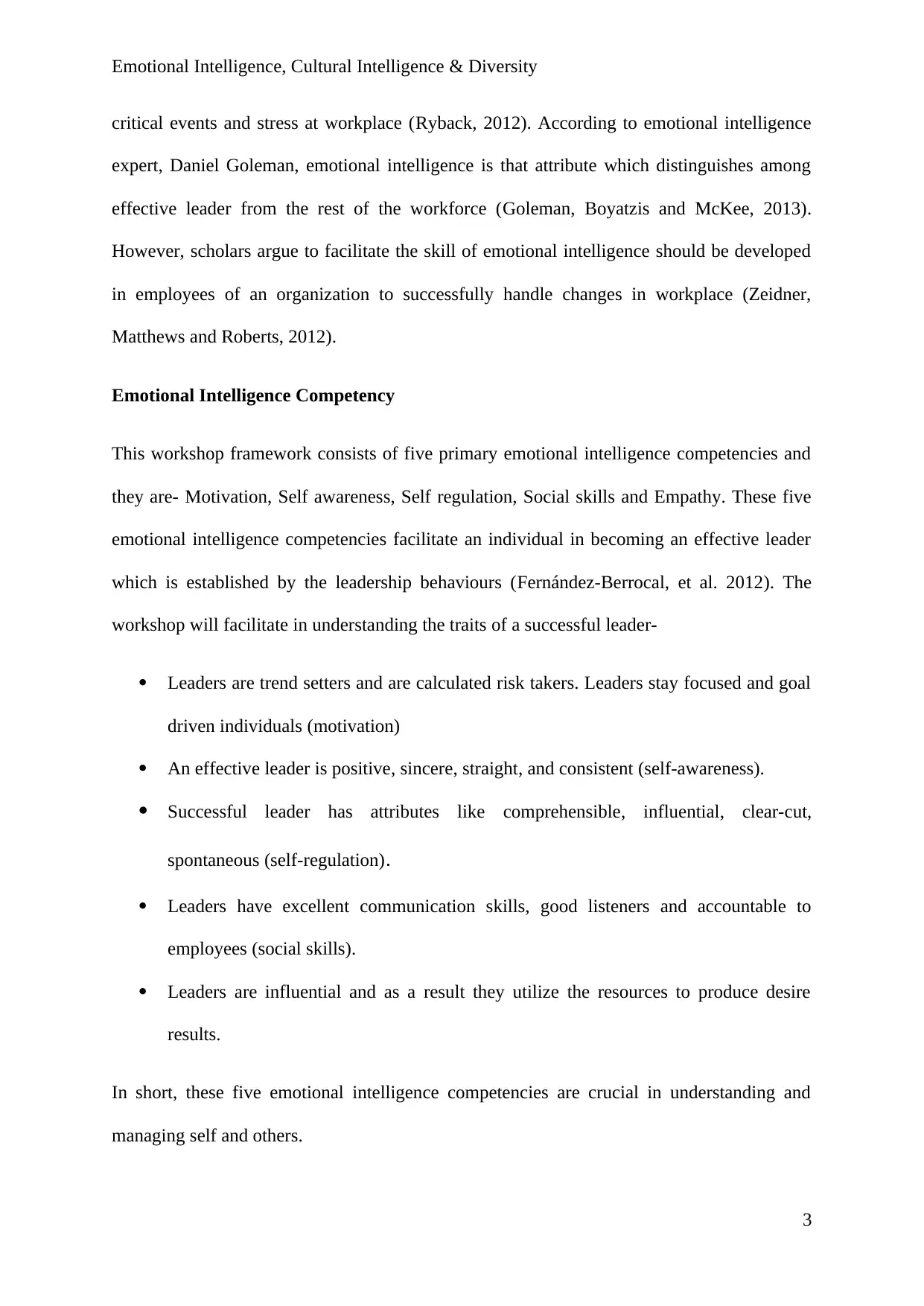
Emotional Intelligence, Cultural Intelligence & Diversity
critical events and stress at workplace (Ryback, 2012). According to emotional intelligence
expert, Daniel Goleman, emotional intelligence is that attribute which distinguishes among
effective leader from the rest of the workforce (Goleman, Boyatzis and McKee, 2013).
However, scholars argue to facilitate the skill of emotional intelligence should be developed
in employees of an organization to successfully handle changes in workplace (Zeidner,
Matthews and Roberts, 2012).
Emotional Intelligence Competency
This workshop framework consists of five primary emotional intelligence competencies and
they are- Motivation, Self awareness, Self regulation, Social skills and Empathy. These five
emotional intelligence competencies facilitate an individual in becoming an effective leader
which is established by the leadership behaviours (Fernández-Berrocal, et al. 2012). The
workshop will facilitate in understanding the traits of a successful leader-
Leaders are trend setters and are calculated risk takers. Leaders stay focused and goal
driven individuals (motivation)
An effective leader is positive, sincere, straight, and consistent (self-awareness).
Successful leader has attributes like comprehensible, influential, clear-cut,
spontaneous (self-regulation).
Leaders have excellent communication skills, good listeners and accountable to
employees (social skills).
Leaders are influential and as a result they utilize the resources to produce desire
results.
In short, these five emotional intelligence competencies are crucial in understanding and
managing self and others.
3
critical events and stress at workplace (Ryback, 2012). According to emotional intelligence
expert, Daniel Goleman, emotional intelligence is that attribute which distinguishes among
effective leader from the rest of the workforce (Goleman, Boyatzis and McKee, 2013).
However, scholars argue to facilitate the skill of emotional intelligence should be developed
in employees of an organization to successfully handle changes in workplace (Zeidner,
Matthews and Roberts, 2012).
Emotional Intelligence Competency
This workshop framework consists of five primary emotional intelligence competencies and
they are- Motivation, Self awareness, Self regulation, Social skills and Empathy. These five
emotional intelligence competencies facilitate an individual in becoming an effective leader
which is established by the leadership behaviours (Fernández-Berrocal, et al. 2012). The
workshop will facilitate in understanding the traits of a successful leader-
Leaders are trend setters and are calculated risk takers. Leaders stay focused and goal
driven individuals (motivation)
An effective leader is positive, sincere, straight, and consistent (self-awareness).
Successful leader has attributes like comprehensible, influential, clear-cut,
spontaneous (self-regulation).
Leaders have excellent communication skills, good listeners and accountable to
employees (social skills).
Leaders are influential and as a result they utilize the resources to produce desire
results.
In short, these five emotional intelligence competencies are crucial in understanding and
managing self and others.
3
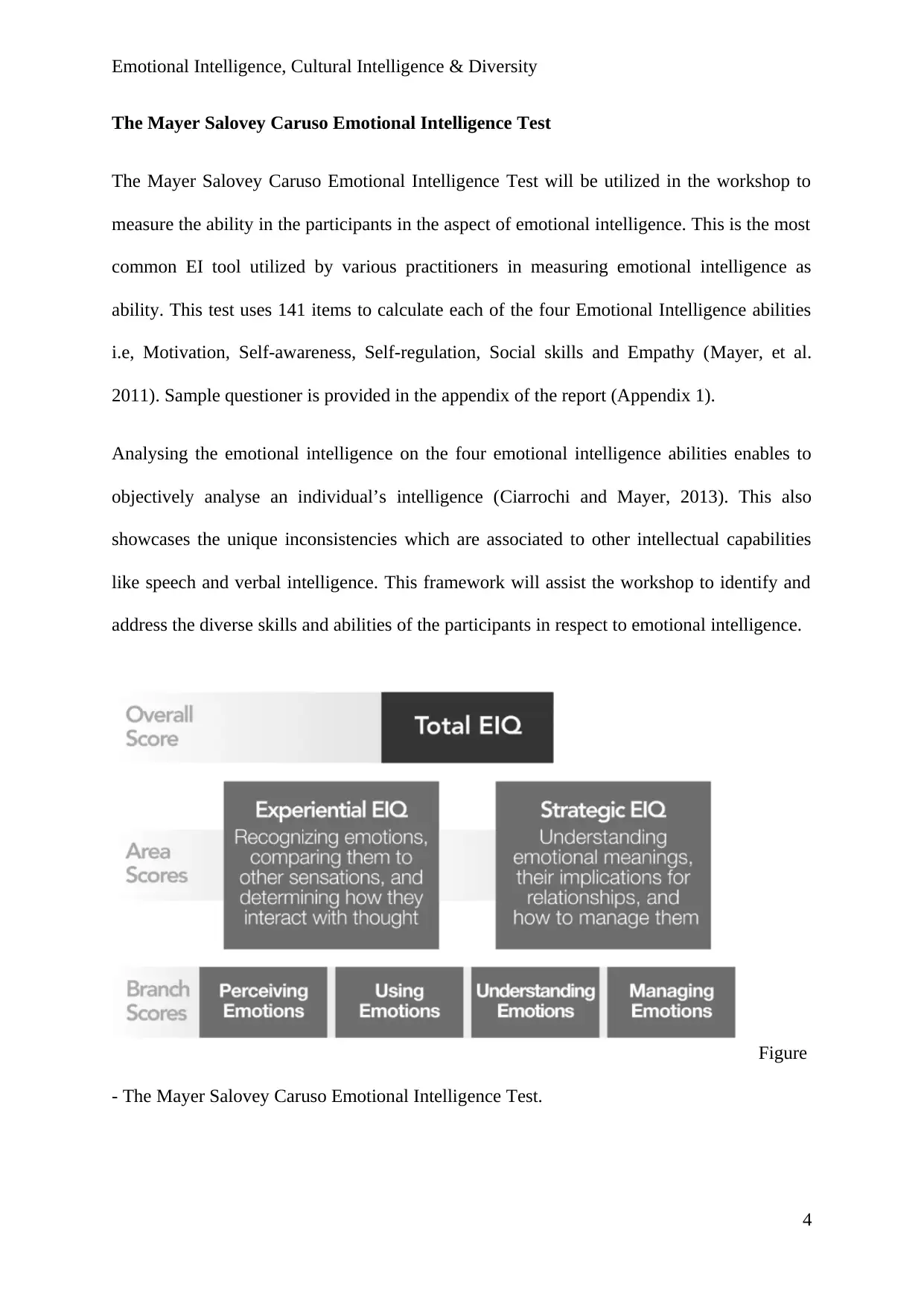
Emotional Intelligence, Cultural Intelligence & Diversity
The Mayer Salovey Caruso Emotional Intelligence Test
The Mayer Salovey Caruso Emotional Intelligence Test will be utilized in the workshop to
measure the ability in the participants in the aspect of emotional intelligence. This is the most
common EI tool utilized by various practitioners in measuring emotional intelligence as
ability. This test uses 141 items to calculate each of the four Emotional Intelligence abilities
i.e, Motivation, Self-awareness, Self-regulation, Social skills and Empathy (Mayer, et al.
2011). Sample questioner is provided in the appendix of the report (Appendix 1).
Analysing the emotional intelligence on the four emotional intelligence abilities enables to
objectively analyse an individual’s intelligence (Ciarrochi and Mayer, 2013). This also
showcases the unique inconsistencies which are associated to other intellectual capabilities
like speech and verbal intelligence. This framework will assist the workshop to identify and
address the diverse skills and abilities of the participants in respect to emotional intelligence.
Figure
- The Mayer Salovey Caruso Emotional Intelligence Test.
4
The Mayer Salovey Caruso Emotional Intelligence Test
The Mayer Salovey Caruso Emotional Intelligence Test will be utilized in the workshop to
measure the ability in the participants in the aspect of emotional intelligence. This is the most
common EI tool utilized by various practitioners in measuring emotional intelligence as
ability. This test uses 141 items to calculate each of the four Emotional Intelligence abilities
i.e, Motivation, Self-awareness, Self-regulation, Social skills and Empathy (Mayer, et al.
2011). Sample questioner is provided in the appendix of the report (Appendix 1).
Analysing the emotional intelligence on the four emotional intelligence abilities enables to
objectively analyse an individual’s intelligence (Ciarrochi and Mayer, 2013). This also
showcases the unique inconsistencies which are associated to other intellectual capabilities
like speech and verbal intelligence. This framework will assist the workshop to identify and
address the diverse skills and abilities of the participants in respect to emotional intelligence.
Figure
- The Mayer Salovey Caruso Emotional Intelligence Test.
4
Secure Best Marks with AI Grader
Need help grading? Try our AI Grader for instant feedback on your assignments.
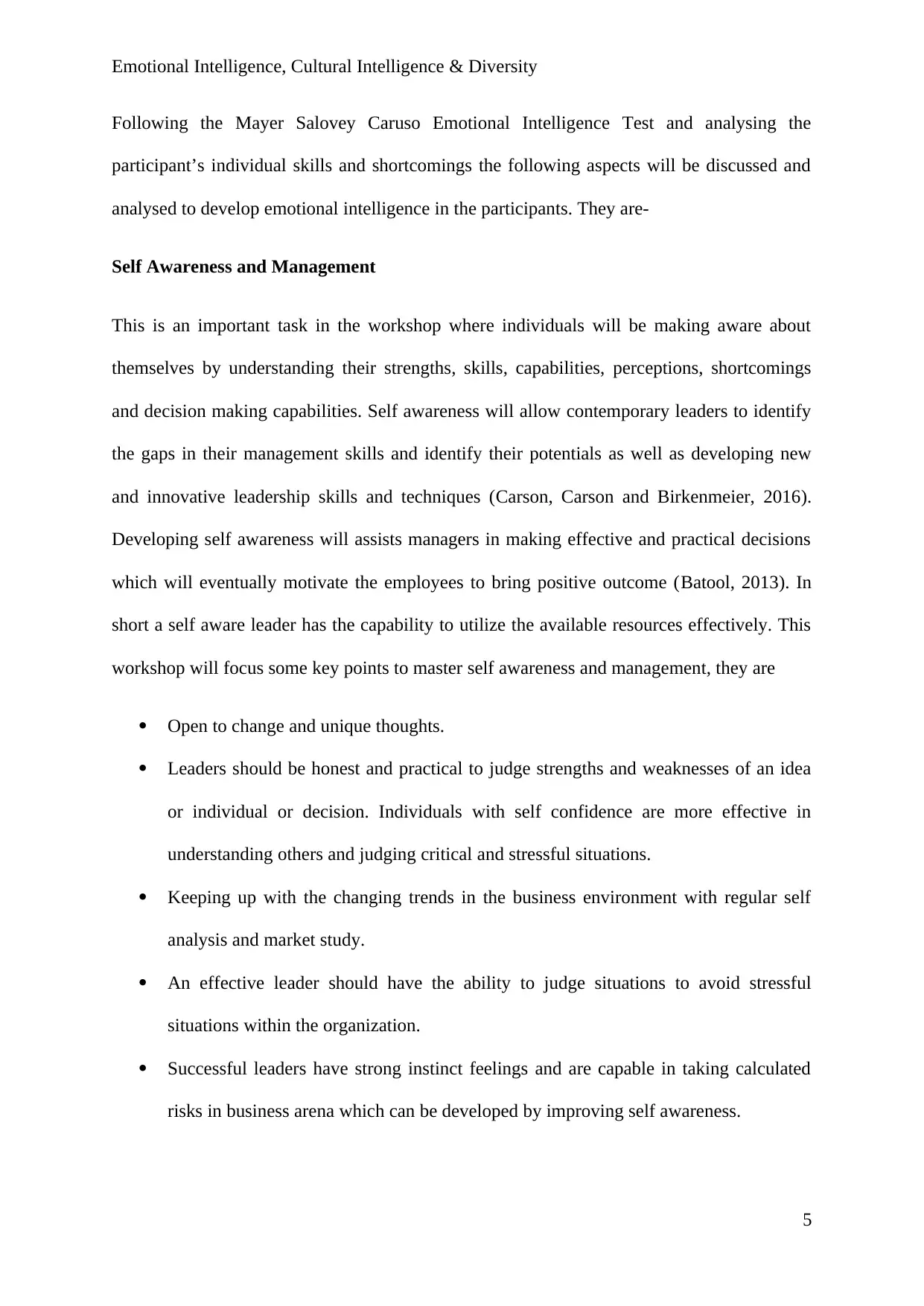
Emotional Intelligence, Cultural Intelligence & Diversity
Following the Mayer Salovey Caruso Emotional Intelligence Test and analysing the
participant’s individual skills and shortcomings the following aspects will be discussed and
analysed to develop emotional intelligence in the participants. They are-
Self Awareness and Management
This is an important task in the workshop where individuals will be making aware about
themselves by understanding their strengths, skills, capabilities, perceptions, shortcomings
and decision making capabilities. Self awareness will allow contemporary leaders to identify
the gaps in their management skills and identify their potentials as well as developing new
and innovative leadership skills and techniques (Carson, Carson and Birkenmeier, 2016).
Developing self awareness will assists managers in making effective and practical decisions
which will eventually motivate the employees to bring positive outcome (Batool, 2013). In
short a self aware leader has the capability to utilize the available resources effectively. This
workshop will focus some key points to master self awareness and management, they are
Open to change and unique thoughts.
Leaders should be honest and practical to judge strengths and weaknesses of an idea
or individual or decision. Individuals with self confidence are more effective in
understanding others and judging critical and stressful situations.
Keeping up with the changing trends in the business environment with regular self
analysis and market study.
An effective leader should have the ability to judge situations to avoid stressful
situations within the organization.
Successful leaders have strong instinct feelings and are capable in taking calculated
risks in business arena which can be developed by improving self awareness.
5
Following the Mayer Salovey Caruso Emotional Intelligence Test and analysing the
participant’s individual skills and shortcomings the following aspects will be discussed and
analysed to develop emotional intelligence in the participants. They are-
Self Awareness and Management
This is an important task in the workshop where individuals will be making aware about
themselves by understanding their strengths, skills, capabilities, perceptions, shortcomings
and decision making capabilities. Self awareness will allow contemporary leaders to identify
the gaps in their management skills and identify their potentials as well as developing new
and innovative leadership skills and techniques (Carson, Carson and Birkenmeier, 2016).
Developing self awareness will assists managers in making effective and practical decisions
which will eventually motivate the employees to bring positive outcome (Batool, 2013). In
short a self aware leader has the capability to utilize the available resources effectively. This
workshop will focus some key points to master self awareness and management, they are
Open to change and unique thoughts.
Leaders should be honest and practical to judge strengths and weaknesses of an idea
or individual or decision. Individuals with self confidence are more effective in
understanding others and judging critical and stressful situations.
Keeping up with the changing trends in the business environment with regular self
analysis and market study.
An effective leader should have the ability to judge situations to avoid stressful
situations within the organization.
Successful leaders have strong instinct feelings and are capable in taking calculated
risks in business arena which can be developed by improving self awareness.
5
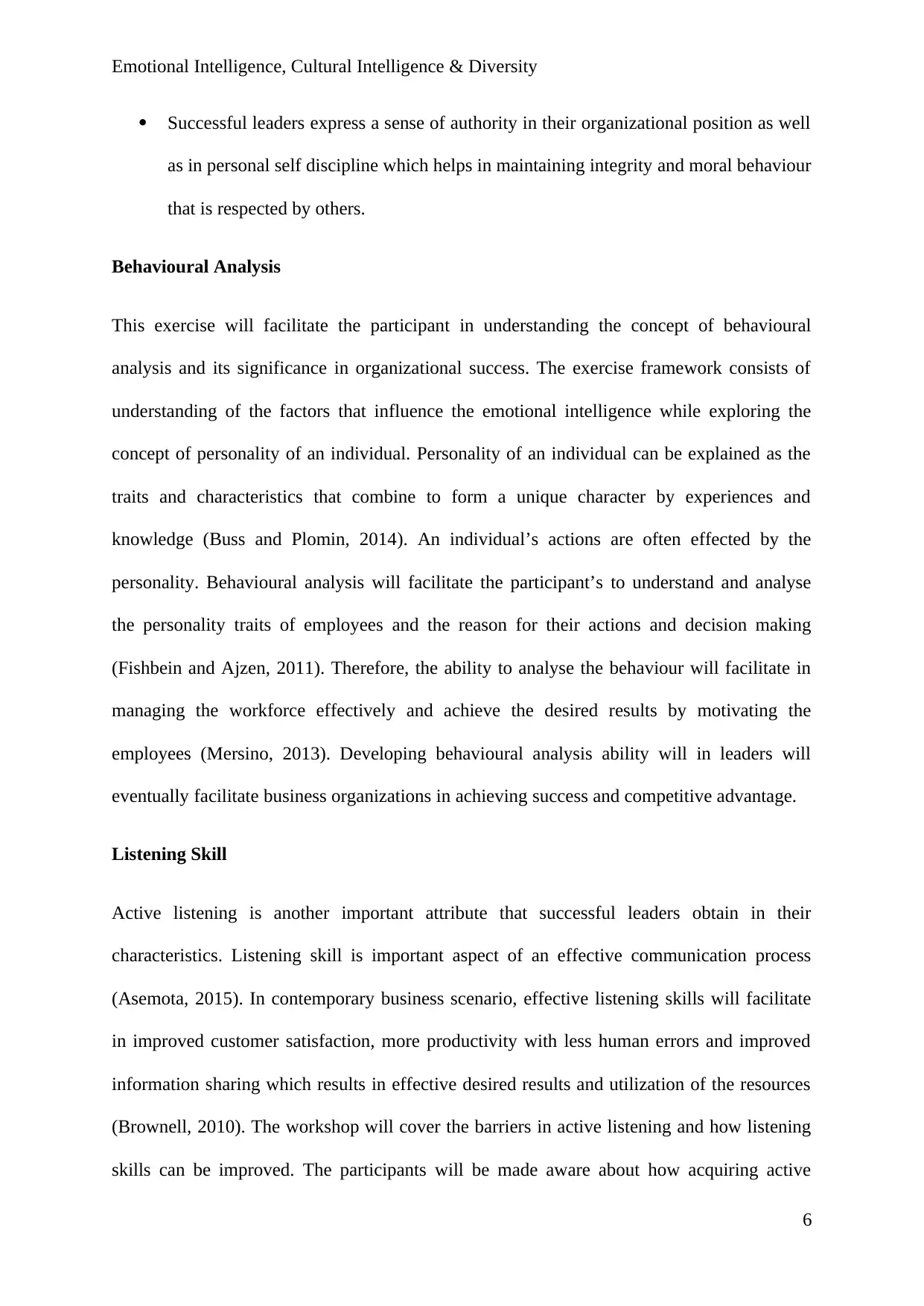
Emotional Intelligence, Cultural Intelligence & Diversity
Successful leaders express a sense of authority in their organizational position as well
as in personal self discipline which helps in maintaining integrity and moral behaviour
that is respected by others.
Behavioural Analysis
This exercise will facilitate the participant in understanding the concept of behavioural
analysis and its significance in organizational success. The exercise framework consists of
understanding of the factors that influence the emotional intelligence while exploring the
concept of personality of an individual. Personality of an individual can be explained as the
traits and characteristics that combine to form a unique character by experiences and
knowledge (Buss and Plomin, 2014). An individual’s actions are often effected by the
personality. Behavioural analysis will facilitate the participant’s to understand and analyse
the personality traits of employees and the reason for their actions and decision making
(Fishbein and Ajzen, 2011). Therefore, the ability to analyse the behaviour will facilitate in
managing the workforce effectively and achieve the desired results by motivating the
employees (Mersino, 2013). Developing behavioural analysis ability will in leaders will
eventually facilitate business organizations in achieving success and competitive advantage.
Listening Skill
Active listening is another important attribute that successful leaders obtain in their
characteristics. Listening skill is important aspect of an effective communication process
(Asemota, 2015). In contemporary business scenario, effective listening skills will facilitate
in improved customer satisfaction, more productivity with less human errors and improved
information sharing which results in effective desired results and utilization of the resources
(Brownell, 2010). The workshop will cover the barriers in active listening and how listening
skills can be improved. The participants will be made aware about how acquiring active
6
Successful leaders express a sense of authority in their organizational position as well
as in personal self discipline which helps in maintaining integrity and moral behaviour
that is respected by others.
Behavioural Analysis
This exercise will facilitate the participant in understanding the concept of behavioural
analysis and its significance in organizational success. The exercise framework consists of
understanding of the factors that influence the emotional intelligence while exploring the
concept of personality of an individual. Personality of an individual can be explained as the
traits and characteristics that combine to form a unique character by experiences and
knowledge (Buss and Plomin, 2014). An individual’s actions are often effected by the
personality. Behavioural analysis will facilitate the participant’s to understand and analyse
the personality traits of employees and the reason for their actions and decision making
(Fishbein and Ajzen, 2011). Therefore, the ability to analyse the behaviour will facilitate in
managing the workforce effectively and achieve the desired results by motivating the
employees (Mersino, 2013). Developing behavioural analysis ability will in leaders will
eventually facilitate business organizations in achieving success and competitive advantage.
Listening Skill
Active listening is another important attribute that successful leaders obtain in their
characteristics. Listening skill is important aspect of an effective communication process
(Asemota, 2015). In contemporary business scenario, effective listening skills will facilitate
in improved customer satisfaction, more productivity with less human errors and improved
information sharing which results in effective desired results and utilization of the resources
(Brownell, 2010). The workshop will cover the barriers in active listening and how listening
skills can be improved. The participants will be made aware about how acquiring active
6
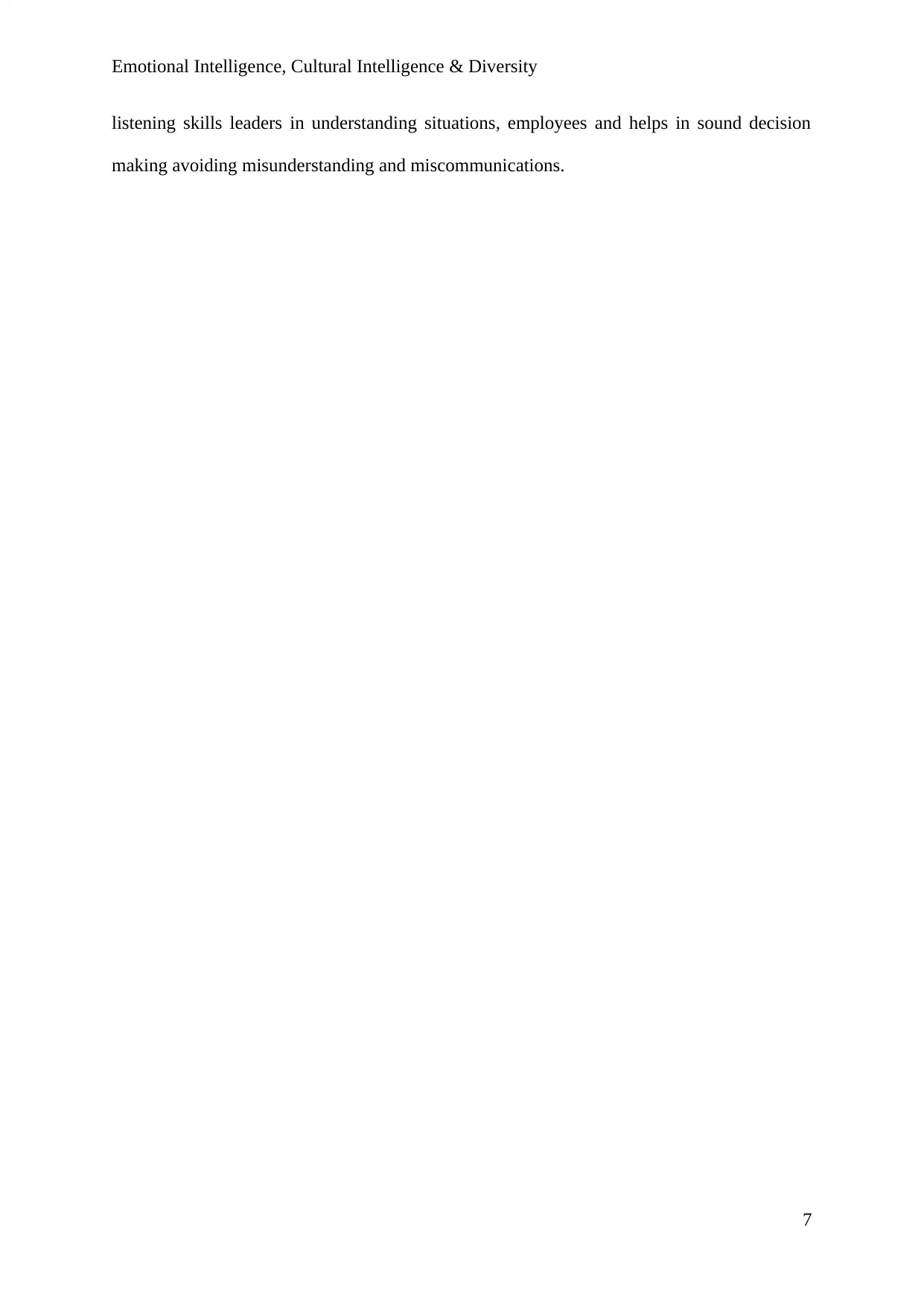
Emotional Intelligence, Cultural Intelligence & Diversity
listening skills leaders in understanding situations, employees and helps in sound decision
making avoiding misunderstanding and miscommunications.
7
listening skills leaders in understanding situations, employees and helps in sound decision
making avoiding misunderstanding and miscommunications.
7
Paraphrase This Document
Need a fresh take? Get an instant paraphrase of this document with our AI Paraphraser
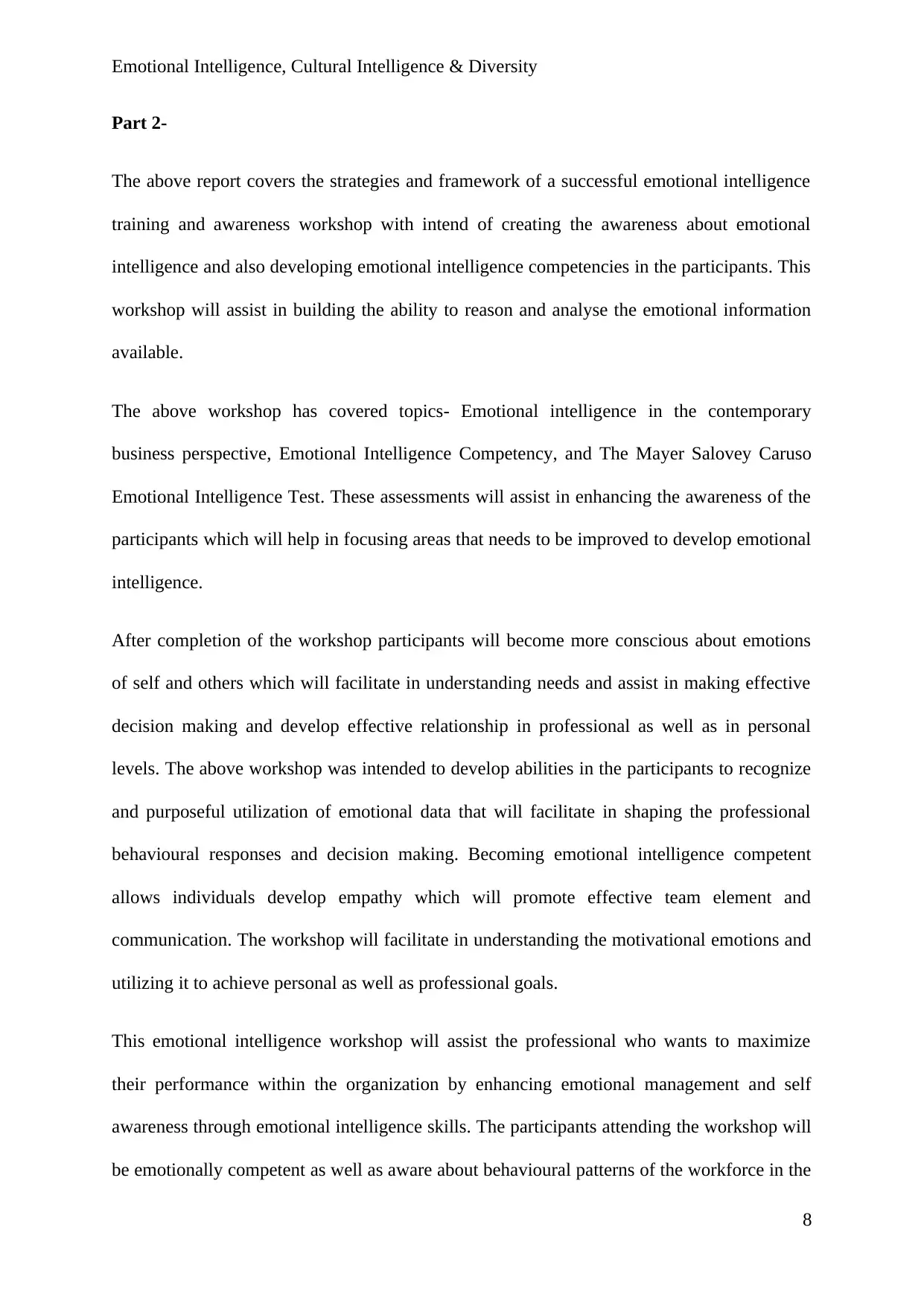
Emotional Intelligence, Cultural Intelligence & Diversity
Part 2-
The above report covers the strategies and framework of a successful emotional intelligence
training and awareness workshop with intend of creating the awareness about emotional
intelligence and also developing emotional intelligence competencies in the participants. This
workshop will assist in building the ability to reason and analyse the emotional information
available.
The above workshop has covered topics- Emotional intelligence in the contemporary
business perspective, Emotional Intelligence Competency, and The Mayer Salovey Caruso
Emotional Intelligence Test. These assessments will assist in enhancing the awareness of the
participants which will help in focusing areas that needs to be improved to develop emotional
intelligence.
After completion of the workshop participants will become more conscious about emotions
of self and others which will facilitate in understanding needs and assist in making effective
decision making and develop effective relationship in professional as well as in personal
levels. The above workshop was intended to develop abilities in the participants to recognize
and purposeful utilization of emotional data that will facilitate in shaping the professional
behavioural responses and decision making. Becoming emotional intelligence competent
allows individuals develop empathy which will promote effective team element and
communication. The workshop will facilitate in understanding the motivational emotions and
utilizing it to achieve personal as well as professional goals.
This emotional intelligence workshop will assist the professional who wants to maximize
their performance within the organization by enhancing emotional management and self
awareness through emotional intelligence skills. The participants attending the workshop will
be emotionally competent as well as aware about behavioural patterns of the workforce in the
8
Part 2-
The above report covers the strategies and framework of a successful emotional intelligence
training and awareness workshop with intend of creating the awareness about emotional
intelligence and also developing emotional intelligence competencies in the participants. This
workshop will assist in building the ability to reason and analyse the emotional information
available.
The above workshop has covered topics- Emotional intelligence in the contemporary
business perspective, Emotional Intelligence Competency, and The Mayer Salovey Caruso
Emotional Intelligence Test. These assessments will assist in enhancing the awareness of the
participants which will help in focusing areas that needs to be improved to develop emotional
intelligence.
After completion of the workshop participants will become more conscious about emotions
of self and others which will facilitate in understanding needs and assist in making effective
decision making and develop effective relationship in professional as well as in personal
levels. The above workshop was intended to develop abilities in the participants to recognize
and purposeful utilization of emotional data that will facilitate in shaping the professional
behavioural responses and decision making. Becoming emotional intelligence competent
allows individuals develop empathy which will promote effective team element and
communication. The workshop will facilitate in understanding the motivational emotions and
utilizing it to achieve personal as well as professional goals.
This emotional intelligence workshop will assist the professional who wants to maximize
their performance within the organization by enhancing emotional management and self
awareness through emotional intelligence skills. The participants attending the workshop will
be emotionally competent as well as aware about behavioural patterns of the workforce in the
8
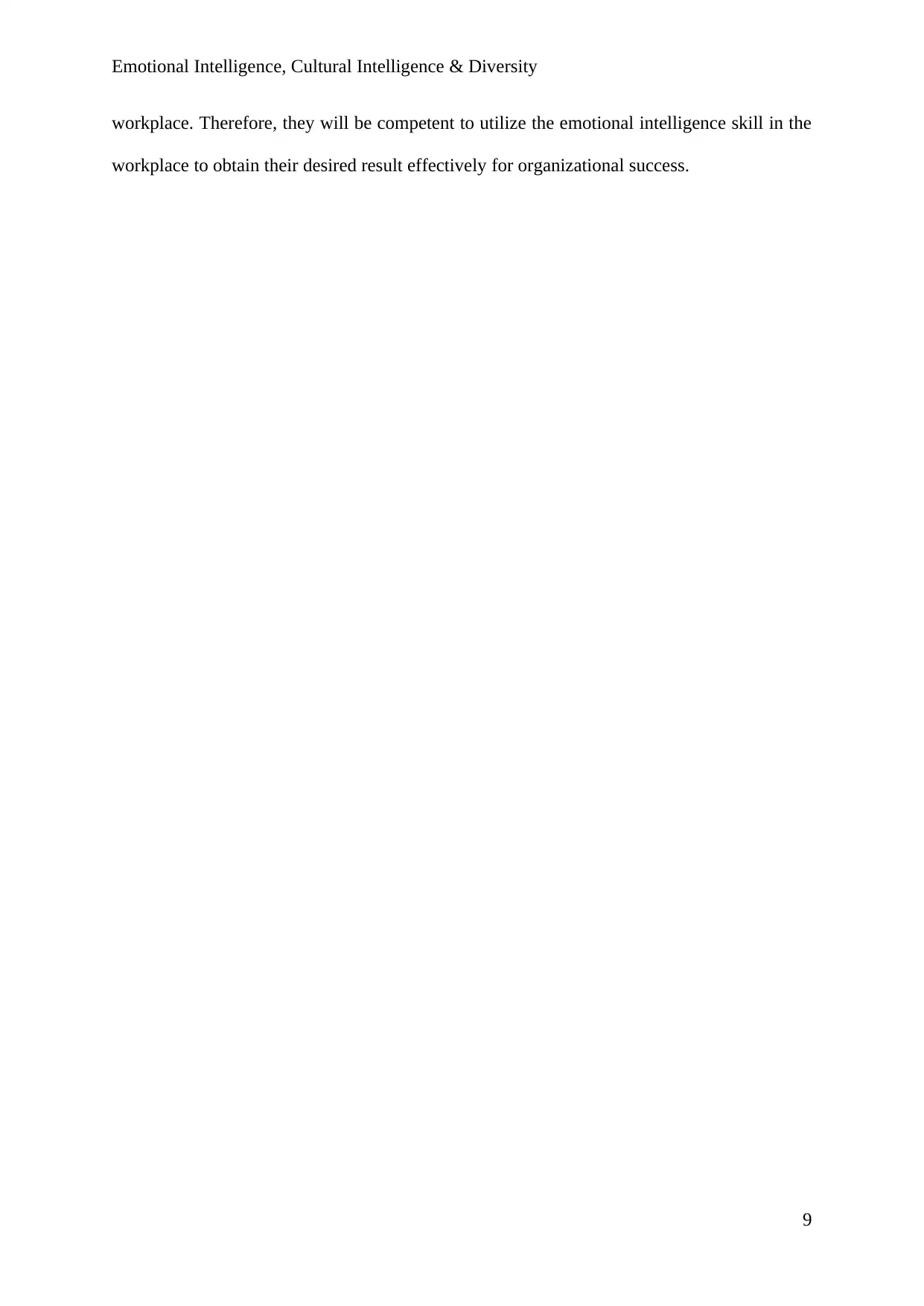
Emotional Intelligence, Cultural Intelligence & Diversity
workplace. Therefore, they will be competent to utilize the emotional intelligence skill in the
workplace to obtain their desired result effectively for organizational success.
9
workplace. Therefore, they will be competent to utilize the emotional intelligence skill in the
workplace to obtain their desired result effectively for organizational success.
9
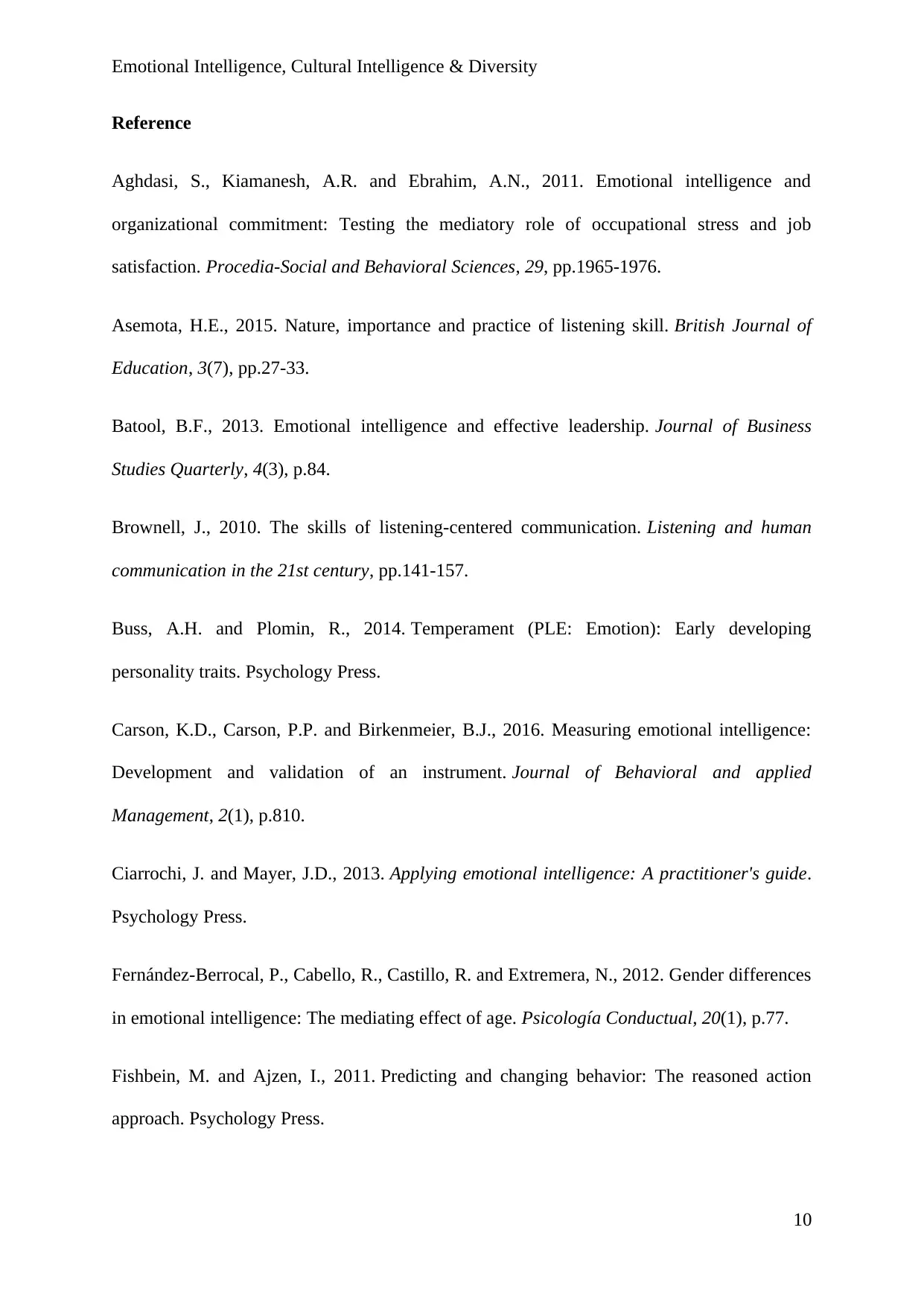
Emotional Intelligence, Cultural Intelligence & Diversity
Reference
Aghdasi, S., Kiamanesh, A.R. and Ebrahim, A.N., 2011. Emotional intelligence and
organizational commitment: Testing the mediatory role of occupational stress and job
satisfaction. Procedia-Social and Behavioral Sciences, 29, pp.1965-1976.
Asemota, H.E., 2015. Nature, importance and practice of listening skill. British Journal of
Education, 3(7), pp.27-33.
Batool, B.F., 2013. Emotional intelligence and effective leadership. Journal of Business
Studies Quarterly, 4(3), p.84.
Brownell, J., 2010. The skills of listening-centered communication. Listening and human
communication in the 21st century, pp.141-157.
Buss, A.H. and Plomin, R., 2014. Temperament (PLE: Emotion): Early developing
personality traits. Psychology Press.
Carson, K.D., Carson, P.P. and Birkenmeier, B.J., 2016. Measuring emotional intelligence:
Development and validation of an instrument. Journal of Behavioral and applied
Management, 2(1), p.810.
Ciarrochi, J. and Mayer, J.D., 2013. Applying emotional intelligence: A practitioner's guide.
Psychology Press.
Fernández-Berrocal, P., Cabello, R., Castillo, R. and Extremera, N., 2012. Gender differences
in emotional intelligence: The mediating effect of age. Psicología Conductual, 20(1), p.77.
Fishbein, M. and Ajzen, I., 2011. Predicting and changing behavior: The reasoned action
approach. Psychology Press.
10
Reference
Aghdasi, S., Kiamanesh, A.R. and Ebrahim, A.N., 2011. Emotional intelligence and
organizational commitment: Testing the mediatory role of occupational stress and job
satisfaction. Procedia-Social and Behavioral Sciences, 29, pp.1965-1976.
Asemota, H.E., 2015. Nature, importance and practice of listening skill. British Journal of
Education, 3(7), pp.27-33.
Batool, B.F., 2013. Emotional intelligence and effective leadership. Journal of Business
Studies Quarterly, 4(3), p.84.
Brownell, J., 2010. The skills of listening-centered communication. Listening and human
communication in the 21st century, pp.141-157.
Buss, A.H. and Plomin, R., 2014. Temperament (PLE: Emotion): Early developing
personality traits. Psychology Press.
Carson, K.D., Carson, P.P. and Birkenmeier, B.J., 2016. Measuring emotional intelligence:
Development and validation of an instrument. Journal of Behavioral and applied
Management, 2(1), p.810.
Ciarrochi, J. and Mayer, J.D., 2013. Applying emotional intelligence: A practitioner's guide.
Psychology Press.
Fernández-Berrocal, P., Cabello, R., Castillo, R. and Extremera, N., 2012. Gender differences
in emotional intelligence: The mediating effect of age. Psicología Conductual, 20(1), p.77.
Fishbein, M. and Ajzen, I., 2011. Predicting and changing behavior: The reasoned action
approach. Psychology Press.
10
Secure Best Marks with AI Grader
Need help grading? Try our AI Grader for instant feedback on your assignments.
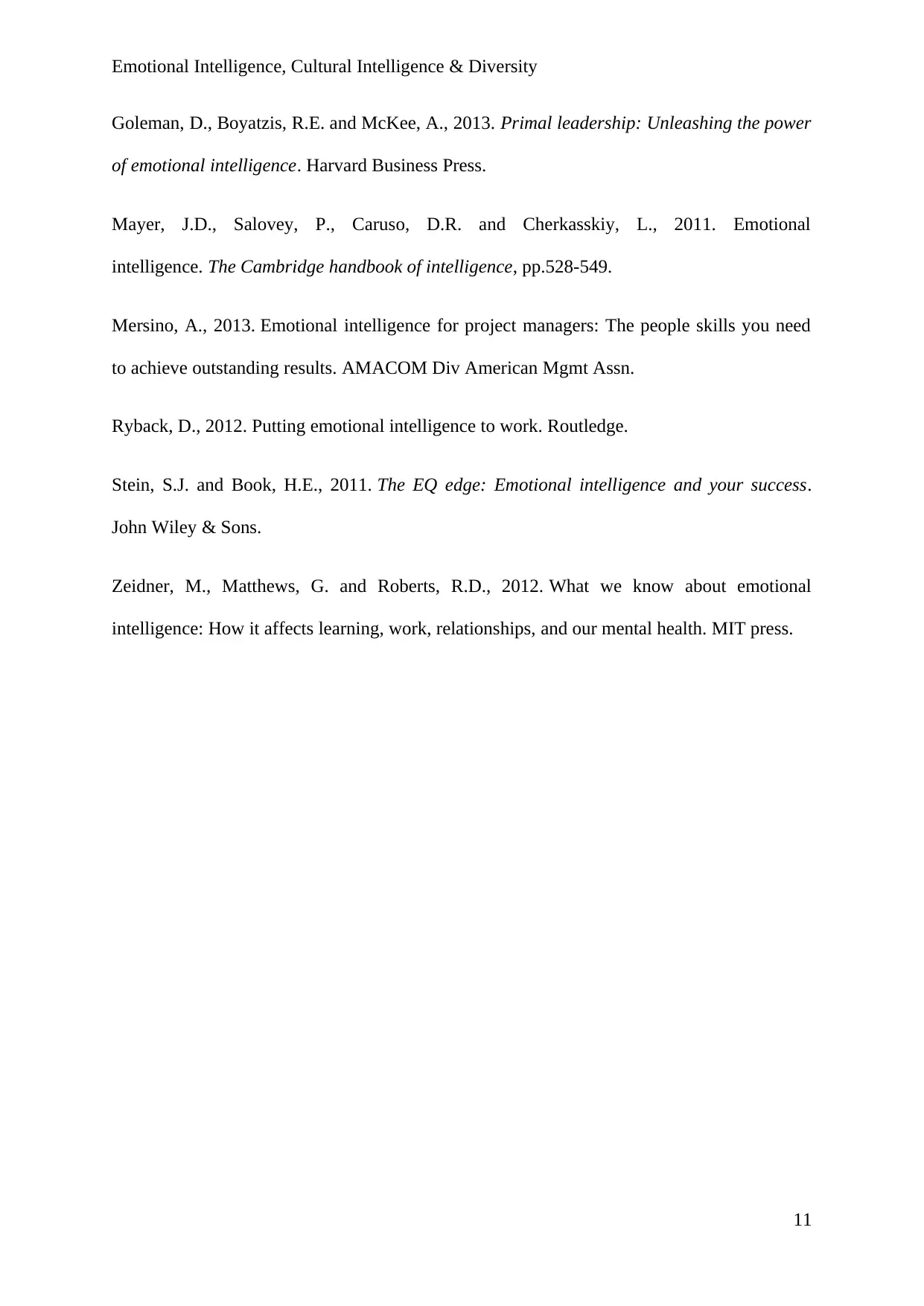
Emotional Intelligence, Cultural Intelligence & Diversity
Goleman, D., Boyatzis, R.E. and McKee, A., 2013. Primal leadership: Unleashing the power
of emotional intelligence. Harvard Business Press.
Mayer, J.D., Salovey, P., Caruso, D.R. and Cherkasskiy, L., 2011. Emotional
intelligence. The Cambridge handbook of intelligence, pp.528-549.
Mersino, A., 2013. Emotional intelligence for project managers: The people skills you need
to achieve outstanding results. AMACOM Div American Mgmt Assn.
Ryback, D., 2012. Putting emotional intelligence to work. Routledge.
Stein, S.J. and Book, H.E., 2011. The EQ edge: Emotional intelligence and your success.
John Wiley & Sons.
Zeidner, M., Matthews, G. and Roberts, R.D., 2012. What we know about emotional
intelligence: How it affects learning, work, relationships, and our mental health. MIT press.
11
Goleman, D., Boyatzis, R.E. and McKee, A., 2013. Primal leadership: Unleashing the power
of emotional intelligence. Harvard Business Press.
Mayer, J.D., Salovey, P., Caruso, D.R. and Cherkasskiy, L., 2011. Emotional
intelligence. The Cambridge handbook of intelligence, pp.528-549.
Mersino, A., 2013. Emotional intelligence for project managers: The people skills you need
to achieve outstanding results. AMACOM Div American Mgmt Assn.
Ryback, D., 2012. Putting emotional intelligence to work. Routledge.
Stein, S.J. and Book, H.E., 2011. The EQ edge: Emotional intelligence and your success.
John Wiley & Sons.
Zeidner, M., Matthews, G. and Roberts, R.D., 2012. What we know about emotional
intelligence: How it affects learning, work, relationships, and our mental health. MIT press.
11
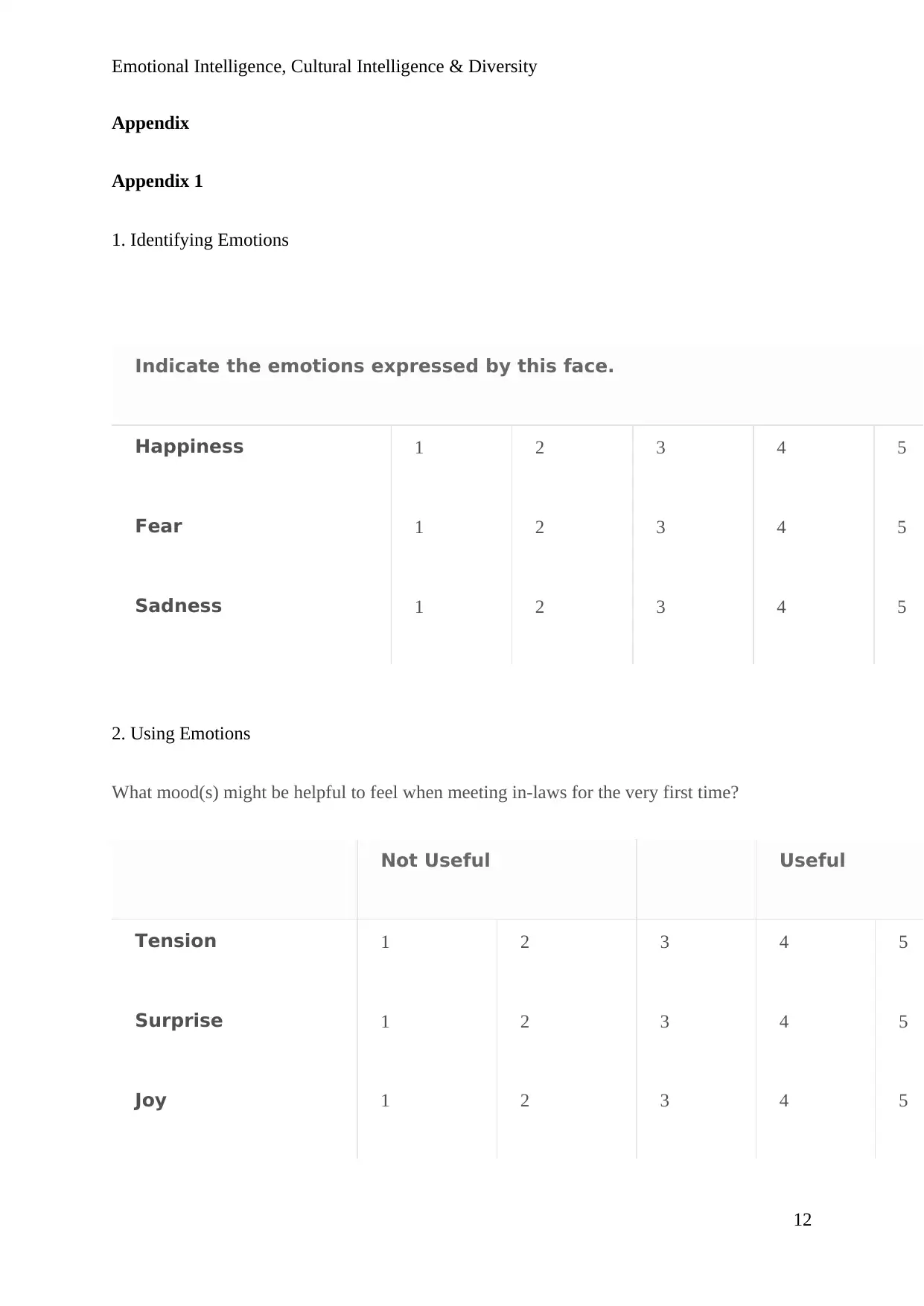
Emotional Intelligence, Cultural Intelligence & Diversity
Appendix
Appendix 1
1. Identifying Emotions
Indicate the emotions expressed by this face.
Happiness 1 2 3 4 5
Fear 1 2 3 4 5
Sadness 1 2 3 4 5
2. Using Emotions
What mood(s) might be helpful to feel when meeting in-laws for the very first time?
Not Useful Useful
Tension 1 2 3 4 5
Surprise 1 2 3 4 5
Joy 1 2 3 4 5
12
Appendix
Appendix 1
1. Identifying Emotions
Indicate the emotions expressed by this face.
Happiness 1 2 3 4 5
Fear 1 2 3 4 5
Sadness 1 2 3 4 5
2. Using Emotions
What mood(s) might be helpful to feel when meeting in-laws for the very first time?
Not Useful Useful
Tension 1 2 3 4 5
Surprise 1 2 3 4 5
Joy 1 2 3 4 5
12
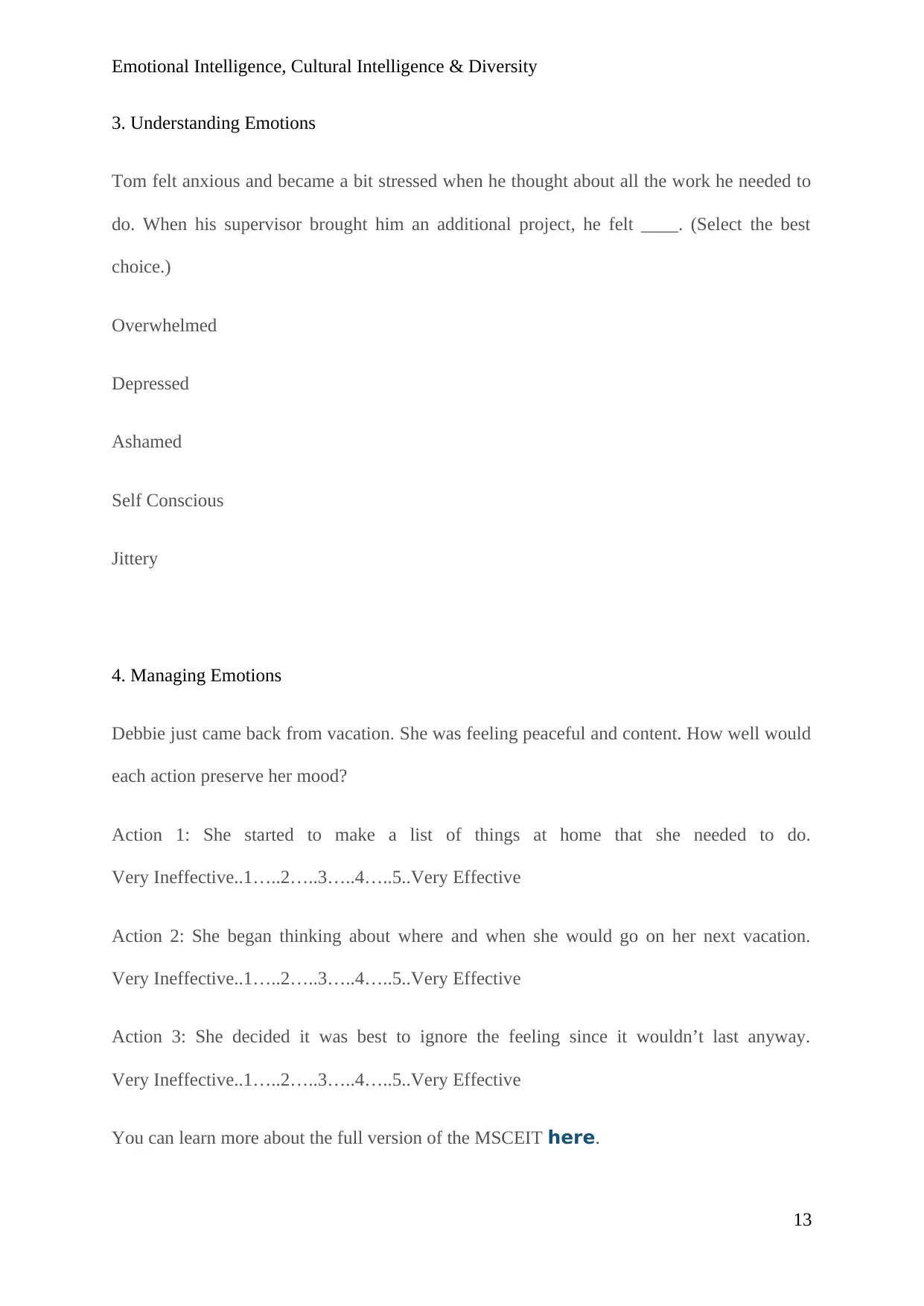
Emotional Intelligence, Cultural Intelligence & Diversity
3. Understanding Emotions
Tom felt anxious and became a bit stressed when he thought about all the work he needed to
do. When his supervisor brought him an additional project, he felt ____. (Select the best
choice.)
Overwhelmed
Depressed
Ashamed
Self Conscious
Jittery
4. Managing Emotions
Debbie just came back from vacation. She was feeling peaceful and content. How well would
each action preserve her mood?
Action 1: She started to make a list of things at home that she needed to do.
Very Ineffective..1…..2…..3…..4…..5..Very Effective
Action 2: She began thinking about where and when she would go on her next vacation.
Very Ineffective..1…..2…..3…..4…..5..Very Effective
Action 3: She decided it was best to ignore the feeling since it wouldn’t last anyway.
Very Ineffective..1…..2…..3…..4…..5..Very Effective
You can learn more about the full version of the MSCEIT here.
13
3. Understanding Emotions
Tom felt anxious and became a bit stressed when he thought about all the work he needed to
do. When his supervisor brought him an additional project, he felt ____. (Select the best
choice.)
Overwhelmed
Depressed
Ashamed
Self Conscious
Jittery
4. Managing Emotions
Debbie just came back from vacation. She was feeling peaceful and content. How well would
each action preserve her mood?
Action 1: She started to make a list of things at home that she needed to do.
Very Ineffective..1…..2…..3…..4…..5..Very Effective
Action 2: She began thinking about where and when she would go on her next vacation.
Very Ineffective..1…..2…..3…..4…..5..Very Effective
Action 3: She decided it was best to ignore the feeling since it wouldn’t last anyway.
Very Ineffective..1…..2…..3…..4…..5..Very Effective
You can learn more about the full version of the MSCEIT here.
13
Paraphrase This Document
Need a fresh take? Get an instant paraphrase of this document with our AI Paraphraser
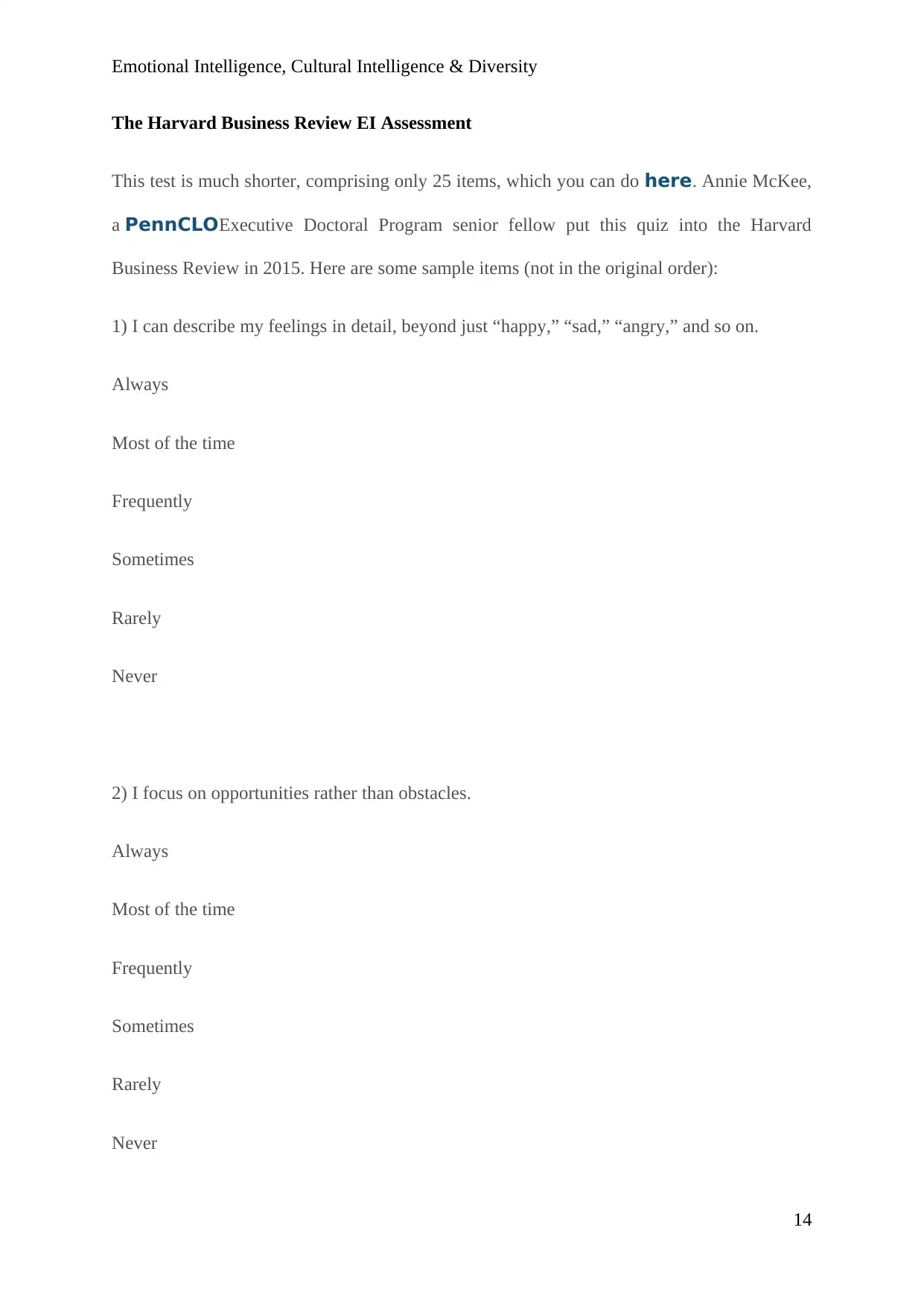
Emotional Intelligence, Cultural Intelligence & Diversity
The Harvard Business Review EI Assessment
This test is much shorter, comprising only 25 items, which you can do here. Annie McKee,
a PennCLOExecutive Doctoral Program senior fellow put this quiz into the Harvard
Business Review in 2015. Here are some sample items (not in the original order):
1) I can describe my feelings in detail, beyond just “happy,” “sad,” “angry,” and so on.
Always
Most of the time
Frequently
Sometimes
Rarely
Never
2) I focus on opportunities rather than obstacles.
Always
Most of the time
Frequently
Sometimes
Rarely
Never
14
The Harvard Business Review EI Assessment
This test is much shorter, comprising only 25 items, which you can do here. Annie McKee,
a PennCLOExecutive Doctoral Program senior fellow put this quiz into the Harvard
Business Review in 2015. Here are some sample items (not in the original order):
1) I can describe my feelings in detail, beyond just “happy,” “sad,” “angry,” and so on.
Always
Most of the time
Frequently
Sometimes
Rarely
Never
2) I focus on opportunities rather than obstacles.
Always
Most of the time
Frequently
Sometimes
Rarely
Never
14
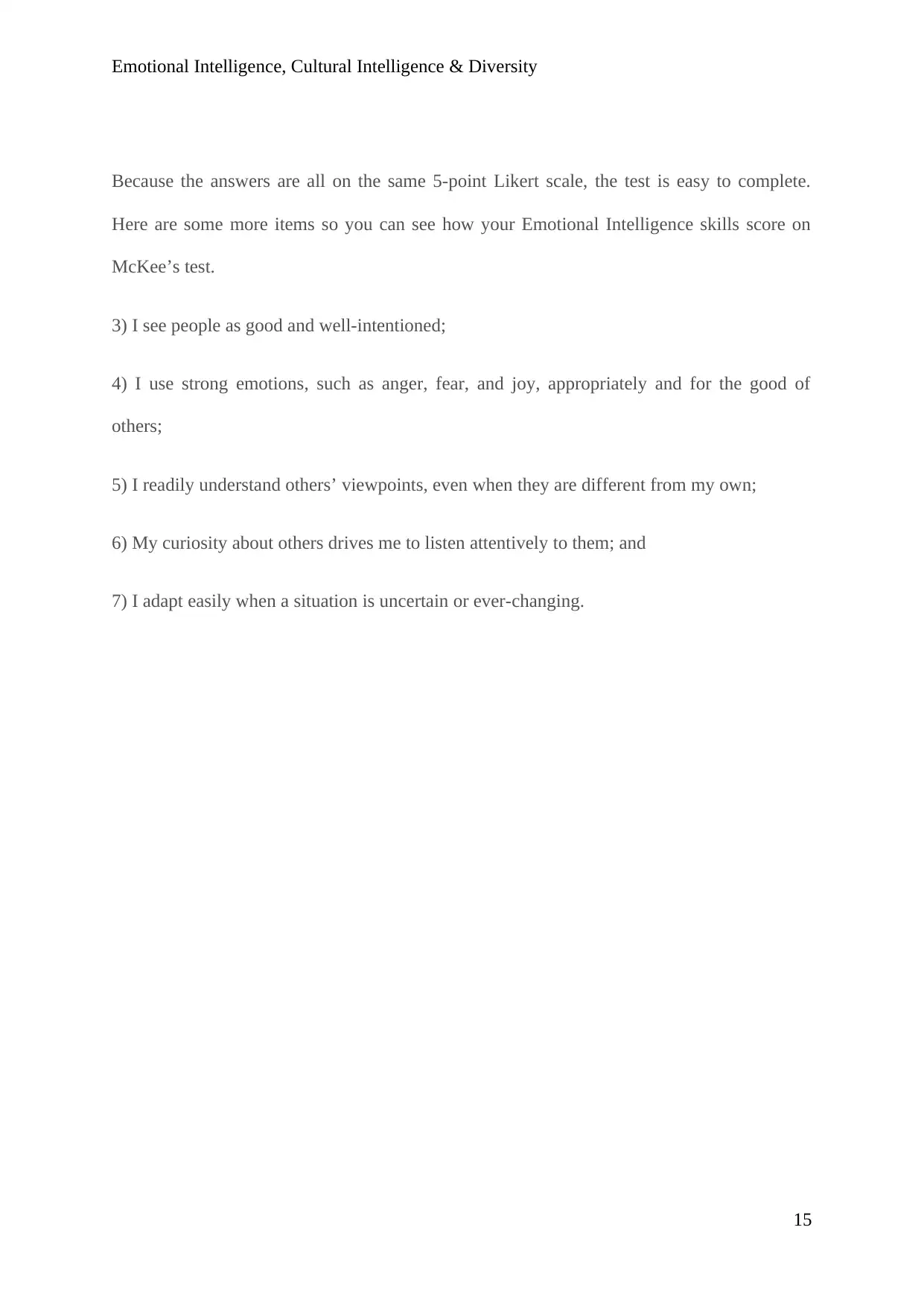
Emotional Intelligence, Cultural Intelligence & Diversity
Because the answers are all on the same 5-point Likert scale, the test is easy to complete.
Here are some more items so you can see how your Emotional Intelligence skills score on
McKee’s test.
3) I see people as good and well-intentioned;
4) I use strong emotions, such as anger, fear, and joy, appropriately and for the good of
others;
5) I readily understand others’ viewpoints, even when they are different from my own;
6) My curiosity about others drives me to listen attentively to them; and
7) I adapt easily when a situation is uncertain or ever-changing.
15
Because the answers are all on the same 5-point Likert scale, the test is easy to complete.
Here are some more items so you can see how your Emotional Intelligence skills score on
McKee’s test.
3) I see people as good and well-intentioned;
4) I use strong emotions, such as anger, fear, and joy, appropriately and for the good of
others;
5) I readily understand others’ viewpoints, even when they are different from my own;
6) My curiosity about others drives me to listen attentively to them; and
7) I adapt easily when a situation is uncertain or ever-changing.
15
1 out of 15
Related Documents
Your All-in-One AI-Powered Toolkit for Academic Success.
+13062052269
info@desklib.com
Available 24*7 on WhatsApp / Email
![[object Object]](/_next/static/media/star-bottom.7253800d.svg)
Unlock your academic potential
© 2024 | Zucol Services PVT LTD | All rights reserved.





